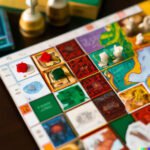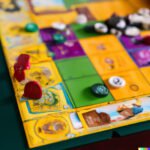Do you remember the joy of gathering around the table with family and friends to play classic kid board games? From Candy Land to Monopoly, these timeless games have a way of bringing people together and creating cherished memories. In this article, we will explore the nostalgia and enduring appeal of classic kid board games and the various benefits they offer for children’s development.
For centuries, classic kid board games have been a beloved pastime for children and adults alike. From ancient origins to modern adaptations, these games have stood the test of time, providing endless entertainment and enjoyment. Today, as technology continues to advance, these traditional games still hold a special place in our hearts, connecting generations through shared experiences and fun-filled game nights.
Playing classic kid board games goes beyond just having fun – it also offers numerous developmental benefits for children. These games can help improve cognitive skills, foster social interaction, and promote emotional development. As we delve into the history, benefits, and top choices of classic kid board games, you’ll discover just how impactful these timeless favorites can be in shaping a child’s upbringing.
History of Classic Kid Board Games
The history of classic kid board games is rich and diverse, with roots that trace back to ancient civilizations. From the early forms of Senet in ancient Egypt to the Chinese game of Go, board games have been a source of entertainment and social interaction for centuries. As societies evolved, so did the design and rules of board games, leading to the creation of timeless classics that are still enjoyed by children and families today.
Ancient Origins
Many classic kid board games have their origins in ancient cultures, where they served as not only a form of recreation but also as a means of teaching important skills such as strategy, critical thinking, and social interaction. Games like Mancala, which originated in Africa more than 1,300 years ago, exemplify how these pastimes have been passed down through generations and across continents.
Medieval Europe and Beyond
During the Middle Ages in Europe, the popularity of board games continued to grow, with chess emerging as one of the most enduring classics. The game’s intricate rules and focus on strategic thinking made it a favorite among nobility and commoners alike. As trade routes expanded and cultures intermingled, various board game designs were shared and adapted, leading to the diverse array of games we now recognize as classics.
Modern Adaptations
In more recent history, classic kid board games have undergone modern adaptations to reflect changes in technology and society. While traditional versions remain beloved by many, digital platforms have allowed for new iterations that bring familiar titles into the 21st century. These adaptations often offer interactive features that enhance gameplay while maintaining the essence of what makes these games so timeless.
Benefits of Playing Classic Kid Board Games
Playing classic kid board games offers a multitude of benefits for children’s cognitive, social, and emotional development. These timeless games provide a fun and engaging way for kids to learn important skills while enjoying quality time with family and friends.
Some of the key benefits of playing classic kid board games include:
- Cognitive Development: Board games can help improve critical thinking, problem-solving, and decision-making skills. Children learn to strategize, plan ahead, and adapt to changing circumstances during the game.
- Social Skills: Board games encourage interaction with others, teaching children how to take turns, communicate effectively, and practice good sportsmanship. Kids also develop teamwork and cooperation as they work together towards a common goal.
- Emotional Development: Through gameplay, kids learn to manage their emotions such as frustration when they lose or excitement when they win. They also build resilience and perseverance as they face challenges during the game.
Furthermore, playing classic kid board games can improve attention span and concentration as children focus on the game at hand. These games also offer an opportunity for parents and caregivers to bond with their kids while teaching valuable life lessons in a relaxed and enjoyable setting.
Top 10 Classic Kid Board Games
Board games have been a staple in family entertainment for centuries, providing endless hours of fun and bonding. Many of these classic kid board games have stood the test of time and continue to be popular choices for children of all ages. From strategy to luck-based games, there is a wide variety of options that cater to different interests and playing styles.
One beloved classic kid board game is Candy Land, which was first introduced in 1949 and has remained a favorite among young children ever since. This game is not only simple and easy to play, but it also teaches kids valuable skills such as color recognition and counting.
Another timeless title is Chutes and Ladders, which dates back to ancient India where it was known as “Snakes and Ladders.” This game has been enjoyed by generations of kids and continues to be a go-to choice for many families.
| Classic Kid Board Game | Year Introduced |
|---|---|
| Candy Land | 1949 |
| Chutes and Ladders | Ancient India (as Snakes and Ladders) |
| Sorry. | 1934 |
| Clue | 1949 |
How to Choose the Right Classic Kid Board Game for Your Child
When selecting a classic kid board game for your child, it is essential to consider their age and developmental stage. Younger children may benefit from simple games that focus on basic skills such as counting, color recognition, and hand-eye coordination. Some popular options for this age group include Candy Land, Chutes and Ladders, and Hi Ho. Cherry-O.
For older children, more complex games that involve strategy, critical thinking, and social interaction can be both entertaining and educational. Titles like Monopoly, Scrabble, Clue, and The Game of Life are excellent choices for kids who are ready to take on more challenging gameplay.
It’s also important to consider the number of players required for each game. While some classic kid board games are designed for two players or more, others may accommodate larger groups. Additionally, you should take into account the average duration of the game to ensure it aligns with your child’s attention span.
| Age | Game |
|---|---|
| 3-5 years old | Candy Land |
| 4-6 years old | Chutes and Ladders |
| 5-7 years old | Hi Ho. Cherry-O |
Tips for Making the Most of Game Night
When it comes to game night, creating a fun and engaging environment for kids is essential to ensure that everyone has a great time. Here are some tips to help you make the most of your game night:
- Choose games that are suitable for the age group of the children participating. Classic kid board games come in various levels of complexity, so make sure to select games that are appropriate for the children’s ages and abilities.
- Create a comfortable and inviting space for game night. Set up an area with ample seating, good lighting, and a clear playing surface. Consider using colorful tablecloths or decorations to make the environment more festive and appealing to kids.
- Encourage good sportsmanship and teamwork among the kids. Emphasize the importance of fair play, taking turns, and cheering on their fellow players. Positive reinforcement can help create a supportive and inclusive atmosphere during game night.
By following these tips, you can ensure that game night is a memorable and enjoyable experience for kids, fostering a love for classic board games that they will carry with them into adulthood.
The Modern Twist
With the advancement of technology, classic kid board games have found a new way to connect with children through digital platforms. The integration of these traditional games into the digital world has brought about a modern twist that appeals to today’s tech-savvy generation. By adapting to digital platforms, classic kid board games are able to maintain their relevance and appeal to a wider audience.
Benefits of Digital Integration
The incorporation of classic kid board games into digital platforms offers a variety of benefits. Firstly, it allows for greater accessibility as children can now play their favorite board games on smartphones, tablets, and computers. This means that they can enjoy these games anytime and anywhere, making them more convenient and portable. Additionally, the digital version of these games often includes interactive features and engaging visuals that enhance the overall gaming experience.
Bringing People Together
One of the notable advantages of classic kid board games connecting with digital platforms is the ability to bring people together from different locations. With online multiplayer options, children can play with their friends or family members who are not physically present. This promotes social interaction and fosters connections among peers, even if they are miles apart. The sense of camaraderie and friendly competition that arises from playing together further enriches the gaming experience for kids.
Educational Potential
Moreover, the integration of classic kid board games into digital platforms opens up opportunities for educational enhancements. Many digital versions of these games incorporate learning elements that help children develop various skills such as critical thinking, problem-solving, and strategic planning. Through interactive gameplay and engaging challenges, kids can sharpen their cognitive abilities while having fun with their favorite classic board games in a modern format.
Preserving the Tradition
In today’s fast-paced, technology-driven world, it is more important than ever to preserve the tradition of classic kid board games and pass them down to future generations. These timeless games have brought joy and entertainment to children for centuries, and their value in promoting social interaction, cognitive development, and emotional growth cannot be overstated. By introducing these games to our children and grandchildren, we can ensure that they continue to appreciate the simple joys of unplugged play.
By sharing classic kid board games with the next generation, we are not only passing down a cherished tradition but also fostering a sense of connection and nostalgia. Many adults have fond memories of playing these games with their own relatives and friends, and by introducing them to young children, we can create new memories that will last a lifetime.
Furthermore, these games provide an opportunity for intergenerational bonding, as older family members can impart their wisdom and experience while enjoying quality time with the young ones.
As we look to the future, it is essential to recognize the enduring value of classic kid board games in a world that is constantly evolving. While digital platforms may offer convenience and novelty, they cannot replace the tangible experience of sitting around a table and playing a game with loved ones.
By preserving and passing down these traditions, we are ensuring that future generations will continue to benefit from the many joys and learning opportunities that classic kid board games have to offer.
Frequently Asked Questions
What Age Is Connect 4 For?
Connect 4 is a game that can be enjoyed by children as young as 6 years old, all the way to adults. The game’s simplicity and quick gameplay make it accessible to a wide range of ages, making it a popular choice for family game nights.
Is Connect 4 Solved?
Connect 4 is considered “solved” in the sense that computer algorithms have determined the optimal strategy for playing the game perfectly, leading to a guaranteed win or draw for one of the players. This was achieved through brute force computation, but in practice, most human players would not be able to consistently play with this level of precision.
Is Connect 4 Trademarked?
Yes, Connect 4 is trademarked by Hasbro, the company that currently produces and sells the game. The trademark ensures that the name “Connect 4” can only be used in relation to products approved or licensed by Hasbro, protecting their branding and intellectual property rights.

I love playing all kinds of games – from classics like Monopoly to modern favourites like Ticket to Ride.
I created this blog as a way to share my love of board games with others, and provide information on the latest releases and news in the industry.





